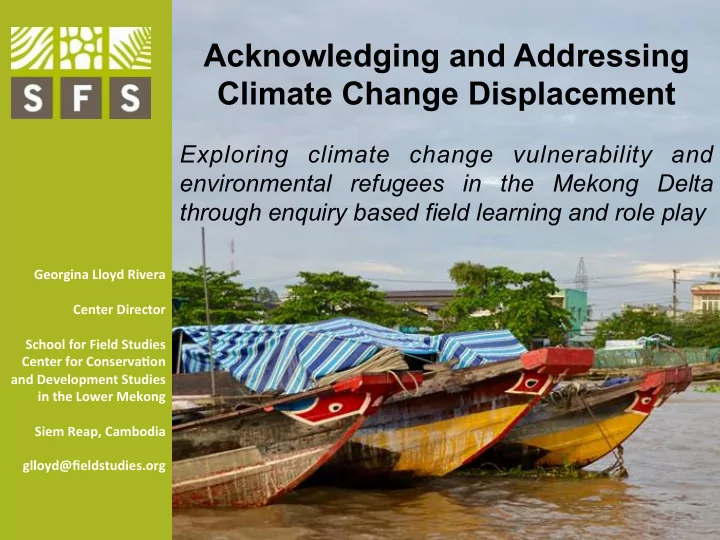

Acknowledging and Addressing Climate Change Displacement Exploring climate change vulnerability and environmental refugees in the Mekong Delta through enquiry based field learning and role play Georgina Lloyd Rivera Center Director School for Field Studies Center for Conserva:on and Development Studies in the Lower Mekong Siem Reap, Cambodia glloyd@fieldstudies.org
SFS strives to create transforma:ve study abroad experiences through field-based learning and research .
SFS Programs Our Centers Australia – Rainforest Studies Bhutan – Himalayan Studies Cambodia – Conserva=on, Ethics and Environmental Change Costa Rica – Sustainable Development Studies Tanzania – Wildlife Management Studies Panama – Tropical Island Biodiversity Studies Peru – Biodiversity and Development in the Andes-Amazon Turks & Caicos Islands – Marine Resource Studies
Environmental Ethics and Development – exploring regional environmental issues drawing upon environmental jus=ce principles and customary norms .
Climate change trends Increasing temperatures Salt water intrusion Changing hydrological cycles Land subsidence Increasing severity and frequency of storms Sea level rise
Displacement in the context of climate change Estimated that 10 million persons will become displaced in the context of climate change in the Mekong Delta (Mekong Migration Network, 2013)
Introduc:on of issues and class discussion • Protection gaps • Migration/ displacement • Distributive justice • Responsibility and accountability • Intergenerational equity • Skewed vulnerabilities • Human rights • Fairness • Unequal global distribution of impacts
Climate change vulnerability
Kakonen (2008).
Social Indicators of Vulnerability Current Poten:al Future Condi:ons Condi:ons Exposure: The extent to which a community comes into contact with climate events or specific climate impacts. This includes areas of residency and resource use exposed to different climate events and impacts. For example, houses near the high-water mark may have high exposure to rising sea levels. Sensi:vity: The degree to which a community is nega=vely affected by changes in climate. Sensi=vity is largely determined by the rela=onship of individuals, households, or a community to resources impacted by climate events, and by the degree of dependency on those resources. For example, if ”exposed” farms are a main source of food and income for a community, family, or group of households, then they may have a high degree of sensi:vity . Adap:ve capacity: The poten=al or capability of a community to adjust to impacts of changing climate. Adap=ve capacity is complex. It may be influenced strongly by a few key characteris=cs, or by a wide range of social characteris=cs. For example, a household that has diversified sources of income and supplementary livelihood op=ons will likely have higher adap:ve capacity to impacts of climate change than those that do not. Wongbusarakum and Loper (2011).
Climate change vulnerability For the peoples of the Mekong Delta, some of whom are highly exposed and highly sensitive to climate changes and have a low adaptive capacity – climate change displacement is not a abstract theory.
Climate Change and Migra:on Roleplay Students imagine the livelihood and environmental impacts of climate change affecting a farmer and subsistence fisher in An Giang Province 30 years from now
Kakonen (2008).
Climate Change and Migra:on Roleplay Students imagine the livelihood and environmental impacts of climate change affecting a farmer and subsistence fisher in An Giang Province 30 years from now
Considering solu:ons and perspec:ves Stakeholder forum on displacement in the context of climate change with students representing local communities, civil society and national government
Final thoughts Developing awareness and critical engagement with climate induced migration Applicability to other regional contexts and potential to focus specifically on legal remedies
References Docherty, B and Giannini, T. 2009. Confronting a Rising Tide: A Proposal for a Convention on Climate Change Refugees. Harvard Environmental Law Review. 33: 349 Kakonen, M. (2008). Mekong Delta at the crossroads: more control or adaptation? Ambio 37 (3): 205-212 Mekong Migration Network and Asian Migrant Center. 2013. Climate Change and Migration: Exploring the Impacts of Climate Change on People’s Livelihoods and Migration in the Greater Mekong Sub-region (GMS). Mekong Migration Network Wongbusarakum, S. and Loper, C. (2011). Indicators to assess community ‐ level social vulnerability to climate change. SocMon. www.socmon.org/download.ashx?docid=64623
Questions? Gratitude to colleagues at The School for Field Studies, Paññ ā s ā stra University of Cambodia and Can Tho University
Recommend
More recommend